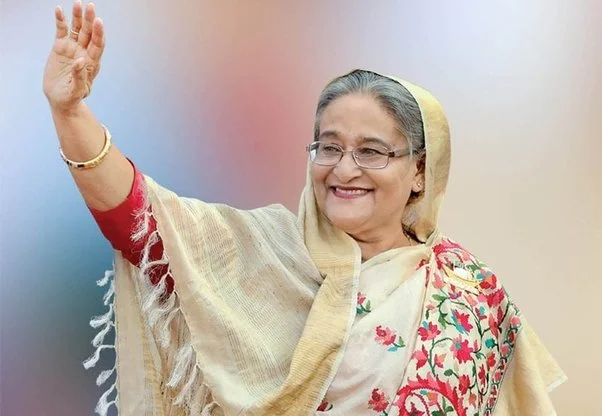
In the annals of political history, few figures have etched their names as indelibly as Sheikh Hasina Wajid, who, until her dramatic fall from power in 2024, held the distinction of being the longest-serving prime minister in the history of Bangladesh. Her tenure, which spanned over two decades, not only marked a significant period in Bangladesh’s political landscape but also set a record as the longest tenure for a female head of government globally.
Sheikh Hasina Wajid, during a period of political turbulence and economic uncertainty. Her initial term was characterized by ambitious reforms aimed at modernizing Bangladesh’s infrastructure, education system, and healthcare. These early efforts earned her accolades both domestically and internationally, as Bangladesh saw marked improvements in various socio-economic indicators.
Throughout her tenure, Sheikh Hasina Wajid navigated complex political landscapes and maintained a firm grip on power. Her ability to secure successive electoral victories and maintain a coalition of support was a testament to her political acumen. By the time of her ousting in 2024, she had accumulated over 20 years of leadership, a feat unmatched in Bangladesh’s history.
Under Sheikh Hasina Wajid’s leadership, Bangladesh experienced significant growth. Her administration was credited with major advancements in infrastructure, including the construction of new highways and bridges, and the expansion of urban development projects. Economic growth during her time in office also saw improvements in sectors such as textiles and pharmaceuticals, boosting Bangladesh’s position on the global stage.
However, her tenure was not without controversy. Allegations of corruption, authoritarian practices, and suppression of political dissent marred her legacy. Critics argued that while her economic policies were beneficial, her approach to governance increasingly stifled political opposition and freedom of speech. The consolidation of power and the weakening of democratic institutions were recurring themes in the criticisms against her administration.
The year 2024 marked a turning point in Sheikh Hasina Wajid’s long reign. A series of violent protests erupted across Bangladesh, fueled by widespread discontent with her government’s perceived failures and increasing autocratic tendencies. The protests, which initially began as peaceful demonstrations, quickly escalated into widespread unrest, with clashes between protesters and security forces leading to significant casualties.
The scale of the unrest forced Sheikh Hasina Wajid to confront a mounting crisis. In response, the government attempted to quell the dissent through a combination of crackdowns and concessions, but these measures proved insufficient to address the root causes of the turmoil. The inability to effectively manage the crisis ultimately led to her overthrow.
Sheikh Hasina Wajid’s departure from office marked the end of an era in Bangladeshi politics. Her legacy is a complex tapestry woven from significant achievements and equally significant controversies. The long-standing nature of her leadership means that her impact on the country will be the subject of debate for years to come.
As Bangladesh moves forward, the nation will grapple with the consequences of her departure and the future path of its political landscape. The transition from her leadership to a new administration will be closely watched, as the country seeks stability and a renewed focus on democratic principles.
In the broader context, Sheikh Hasina Wajid remains a historical figure whose unprecedented tenure both inspired and provoked. Her story is a powerful reminder of the ways in which political power can shape, and sometimes destabilize, the course of a nation.
Sheikh Hasina Wajid has a net worth of USD 190 million. She owns over 100 real estate assets, jewellery, gold and millions of cash in foreign banks, Hasina also own over 25 luxury vehicles. Real estate properties across Bangladesh, Singapore and Dubai worth over USD 18 million.
Karachi International Container Terminal (KICT) categorically rejects the inaccurate and misleading claims recently published in…
Spotify releases its fourth quarter 2025 earnings, marking a strong finish to the year with…
ABHI Microfinance Bank Ltd. (Abhi MFB) has entered into a strategic partnership with 1LINK to…
The Government of Pakistan recently convened the Informal Retreat of D-8 Commissioners in Lahore, providing…
Violence Escalates Amidst Unresolved Peace Talks Israeli airstrikes and gunfire have once again struck the…
ISLAMABAD—Barrister Salman Safdar, appointed by the Supreme Court as a friend of the court, held…
This website uses cookies.